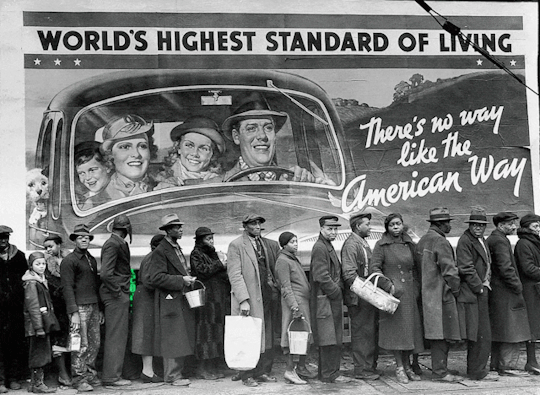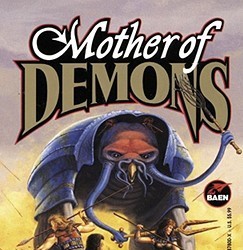#Eric Flint
Text

Tech workers spent a whole generation conceiving of themselves as entrepreneurs who bargained, nerd-to-nerd, with other entrepreneurs who needed workers as much as workers needed paychecks.
These workers allowed themselves to be convinced that being “extremely hardcore” — that is, working body- and mind-ruining hours (without overtime pay) was a badge of honor.
They let themselves believe that their bosses gave them gourmet cafeteria food, “on-campus” fitness centers and daycare because they were valued workers — and not because this created the conditions where workers could be induced to put in longer hours without additional pay.
They conceived of themselves as ascetic monks, a priesthood that labored every hour God sent to bring digitization to the world. Meanwhile, their bosses’ wealth soared, even as their own working conditions deteriorated.
Tech workers may be prone to the same rationalization and self-deception as the rest of us, but (like the rest of us), they aren’t fools. Anything that can’t go on forever will eventually stop.
As conditions and prospects worsened, tech workers’ identities as workers emerged from a generation-long coma. They penned manifestos, walked off the job, and formed unions.
-The proletarianization of tech workers: If there is hope, it is in the proles
#eric flint#science fiction#tech workers#labor#unions#there is power in the union#sf#labor organizing#proletarianization
699 notes
·
View notes
Text
Currently rereading Eric Flint's 1632 and reflecting on just how influential Flint was to me and my approach to both praxis and politics as a teenager. I found Flint when I was about thirteen or fourteen, around the time I found Pratchett I think, and he's left an equally wide thumbprint on my soul. Isn't that the most wonderful thing about stories, that people you've never met can help shape our adult selves? Mother of Demons I often recommend for its SFF worldbuilding--Flint built a species with at least four genders, only some of which are reproductive, and associated "normal" sexual orientations, and then proceeded to write in a textually intersex character and queer the hell out of it.
1632, though, is the one where a little West Virginia town in 2000 gets picked up and dropped in the middle of Thuringia, Germany in the eponymous year--right in the middle of the Thirty Years War. The local United Mine Workers of America chapter plays a major role, particularly its head.
As I write this I'm listening to the scene where the little town of Grantville, having admitted after a few days that they are probably not ever going home, is crowded into the high school gymnasium listening to the mayor lay that reality out and suggesting an interim council to help the town set out a sort of constitutional convention so they can work out what on earth they're going to do moving forward--especially since there's a bunch of displaced refugees collecting in the forests nearby. Sensible of them, really; the Americans murdered the shit out of the local soldiers that displaced them, on account of how the shaken mine workers that went out to figure out WTF happened not being super down with suddenly running into a bunch of fuckheads raping the locals and torturing people to find out where their valuables might be. After that, said Americans proceeded to retreat into the town boundaries and gibber quietly to themselves. I would go lurk in their woods, too.
Anyway, the mayor sets up this proposal, everyone agrees, and a CEO who was visiting for his son's wedding at the time steps forward and says: look. I know how to lead, and I'm probably the most qualified person here. I lead a major industry corporation effectively and I did that after my time as a Navy officer. I put myself forward because I'm qualified. Now, we're going to need to circle the wagons to get through the winter, tighten our belts, but we can get through this. We can't support all these refugees, though; we'll have to seal the border so they can't bring disease--they're a drain on our resources we can't afford--
and the UMWA guy, he gets really mad listening to this. There's this Sephardic refugee woman he's real taken with who got swept up in the town first thing, and she's sitting in and listening; he's thinking about throwing her out, thinking about how much she knows about the place they're found in, and he's furious. But he gets a good grip on his anger and he marches up and he says, look. This dude has been here two days and he's already talking about downsizing?! You're going to listen to this CEO talking about cuts, cuts, cuts? Nah. Trying to circle the wagons is probably impossible, it's stupid, and if you think my men and I are going to enforce that, you can fuck off. That proposal is inside out and bass ackwards. We've got about a six mile diameter of Grantville here; how much food do YOU think we're going to grow? How about the soldiers wandering around, do you think we're going to be able to fight armies off on our lonesome? Look at the few refugees we already have in the room, they'll tell you how those armies will treat you! We could do it for a while, the amount of gun nuts here, but so what? We don't have enough people to shoot them! Not if we're going to do anything else to keep us going! We have about six months of stockpiled coal to keep going, and without another source or getting the coal mines working, we're screwed. We have technical strength but we don't have the supplies or resources we would need to maintain it. Those refugees? They're resources. We need people to do the work we will need to keep ourselves. The hell with downsizing; let's grow outwards! Bring people in, give them safety, see what they can bring to the table once they've had a moment! He invokes: send us your tired, your poor!, and the CEO yells in frustration: this isn't America! so he yells back "it will be!"
And of course everyone cheers. I love Flint for many reasons but he is unapologetic about affection for the America of ideals--ideals, he freely admits, that are often honored in the breach rather than the observance, ideals that are messy and flawed, but nevertheless ideals that can work to inspire us to become the best version of ourselves. For Flint, history is as valuable as a source of stories to inspire ourselves as it is a repository of knowledge, and on this I tend to agree with him. We must learn from our moments of shame but equally we must learn from moments that show us how to be our best selves.
It's been twenty three years and the text is now an interesting historical document in its own right, hitting points and rhythms in beats that are sometimes out of place today. It's not perfect. But the novel contains a commitment to joy and to emphasizing the leaps of faith and understanding that regular, everyday people make every day to try and support each other that I routinely try to match in my writing.
Anyway, one of the strengths of the novel, I think, is its gender politics: it's a very ensemble kind of novel, lots of characters, and it's preoccupied with positive masculinity in a lot of ways. There's a lot of these hyper masculine characters--Mike Stearns perhaps more than anyone else--and--and...
... And Flint's characterization of Stearns, as he sketches out who the man is--his pivotal American leader, ex boxer, working class organizer, big man.... well, it lands equally on "he is delighted and astonished to find a local woman who quickly assesses how the cushion of air in tires works," and "he considers who to set up a Jewish refugee in the middle of Germany up with and he thinks to ask the Jewish family he grew up with to host her and her ill father because he thinks she'll be most comfortable there", and "he views people as potential assets rather than potential drains." A younger man asks him for advice on whether to pursue a professional sports career because of the boxing and he says no, you're in the worst place of not being quite good enough and you'll blow out your knees without accomplishing safety. He frames that interaction such that he allows his own experiences to make him vulnerable and invite the younger man to understand when a struggle have worth it.
It's actually a really deft portrayal of intense masculinity that also makes a virtue of a bunch of traits more usually associated with women: empathy, relational sensitivity, the ability to listen. As a blueprint for what a positive masculinity can look like, vs the toxic kind, it's very well done. I think sometimes when we look at gender roles in terms of virtues, and when masculinity is defined in terms of opposition to femininity, people get lost by arguing that virtues assigned to one gender are somehow antithetical to another gender. In fact that's never been the case: virtues are wholly neutral and can appear in any gender. What the gender does is inflect the ways we expect that virtue to appear in terms of individuals' actions within their society.
Gender isn't purely an individual trait, basically; it's a product of our collective associations. Two characters with different genders can display the same virtues and strengths, but we imagine them expressed in different ways according to our cultural expectations around gender. And I just think that's neat.
946 notes
·
View notes
Text
Today, Eric Flint passed away.
I know I'm probably one of the only people on this whole site who really cares about that, but goddamn does this break my heart.
For those who aren't aware, Flint was famous for being one of the best writers in the entire alternate history genre. His best work is the incredibly long-running (and genuinely well-written) Ring of Fire series, which chronicles the tale of Grantville, a West Virginian coal mining town which is magically transported back in time from the year 2000 to 1631 Thuringia during the Thirty Year's War.
Flint was a genuinely fantastic writer, and not just among the (admittedly low) standards of the alternate history genre. Flint showed that alternate history stories didn't have to be boring glorified textbooks full of unlikable characters constantly based around Nazis winning WWII or other tripe; he reminded us just how *vast* history truly could be, how storied, fantastical, and just plain fun it could be to explore, how you could included actually likable and interesting characters, how you can write genuinely interesting love stories, and have characters let their hair down and banter in a sci-fi setting.
Flint was the kind of guy to ask "What if the Serene Republic of Venice got access to magic and become an expansionist empire?", "What if hyper-advanced A.I.s traveled back in time to the Byzantine Empire and tried to re-write history in the name of either fascism or democracy?" or even "What if the Cherokee and lots of freedmen formed their own republic in Arkansas after the War of 1812?" Flint was a writer who helped uplift and support other authors, had helped save the works of authors who have been out of print for decades, and pretty much single-handedly revolutionized how modern authors do electronic publishing.
Eric Flint was a writer who reminded the alternate history and sci-fi genres that your stories can be actual stories and not just bland explorations of potentially interesting ideas.
Eric Flint passed away today, and the world is all the poorer for it.
#eric flint#sadness#rip eric flint#rip#rest in peace eric flint#1632 series#1632#belisarius#assiti shards#assiti
11 notes
·
View notes
Text
Eric Flint, U.S. science fiction author, dies (news).
Eric Flint, U.S. science fiction author, dies (news).
Baen Books, the main publisher for U.S. science fiction author Eric Flint, has posted the sad news on Eric’s passing on July 17th, 2022. He had been ill for a while fighting cancer, we understand.
Eric, a Californian born in 1947, supported himself in various occupations including longshoreman, truck driver, machinist, and labour union organiser. Flint also became a political activist in the…

View On WordPress
9 notes
·
View notes
Text
Eric Flint
So I’ve seen memorial posts going around today, but none for Eric Flint, and I can’t do a proper post, but he deserves to be remembered too. Eric Flint created the 1632 ‘verse and was instrumental in mentoring young writers. He will be sorely missed.
2 notes
·
View notes
Text
FUCK
Eric Flint is dead!
#Eric Flint#Ring of Fire Series#Best wishes to his friends and family of course#that was my third thought#my first was 'fuck' and my second was 'well shit that series is never getting finished ever'#which is bad but I mean I think pretty normal reactions?#But still#Sad that he's dead
2 notes
·
View notes
Text
So today I finished reading 1636: The Vatican Sanction, and I can't help but keep thinking that it's incredibly fortunate that the Catholic priest Grantville had when it got pulled back in time, Larry Mazzare, was a decent fellow, and not, like, an openly political or a heretic or something, like the celebrity priests that hit the news sometimes.
[I decided against naming names in writing this post.]
1 note
·
View note
Text
I saw on the Honorverse forum, that Eric Flint, who wrote Crown of Slaves, and the 1630 series, among other things, passed away, at age 75, recently.
The weird thing is, yesterday, I checked out CoS from my library, to try to read it (I tried before, and never finished it).
1 note
·
View note
Text
Eric Flint, U.S. science fiction author, dies (news).
Eric Flint, U.S. science fiction author, dies (news).
Baen Books, the main publisher for U.S. science fiction author Eric Flint, has posted the sad news on Eric’s passing on July 17th, 2022. He had been ill for a while fighting cancer, we understand.
Eric, a Californian born in 1947, supported himself in various occupations including longshoreman, truck driver, machinist, and labour union organiser. Flint also became a political activist in the…

View On WordPress
0 notes
Photo




BLACK SAILS (2014-2017)
INTERVIEW WITH THE VAMPIRE (2022- )
“Has he been like this all day?”
“More or less, ma'am, yes.”
“Mr. du Lac would like to apologize and continue with the interview, if you are in...”
“Still recording.”
#it's the cleavage in both scenes for me <3#iwtv#black sails#blacksailsedit#iwtvedit#interview with the vampire#james mcgraw#thomas hamilton#miranda hamilton#louis de pointe du lac#armand#rashid#daniel molloy#james flint#miranda barlow#beegifs#jacob anderson#assad zaman#eric bogosian#rupert penry jones#louise barnes#toby stephens
576 notes
·
View notes
Text

Remember when tech workers dreamed of working for a big company for a few years, before striking out on their own to start their own company that would knock that tech giant over?
Then that dream shrank to: work for a giant for a few years, quit, do a fake startup, get acqui-hired by your old employer, as a complicated way of getting a bonus and a promotion.
Then the dream shrank further: work for a tech giant for your whole life, get free kombucha and massages on Wednesdays.
And now, the dream is over. All that’s left is: work for a tech giant until they fire your ass, like those 12,000 Googlers who got fired six months after a stock buyback that would have paid their salaries for the next 27 years.
We deserve better than this. We can get it.
-The proletarianization of tech workers: If there is hope, it is in the proles
#eric flint#science fiction#tech workers#labor#unions#there is power in the union#sf#labor organizing#proletarianization
253 notes
·
View notes
Text
While my last post on Eric Flint's 1632 has been making the rounds, I have been reading the sequels: first the short story anthology Ring of Fire, and then the more direct sequel 1633.
When we left our friends in the first book, our primary surviving antagonists were a) John Simpson, ex-CEO and anti-German conservative asshole, and b) General Albrecht von Wallenstein, last seen with his jaw shattered after the attack on a school full of children.
In classic Flint fashion, Ring of Fire immediately sets about humanizing both of them and coming up with reasons to make both of them work with Grantville allies we have good reasons to be fond of: Simpson working closely with Jeff's friend Eddie Cantrell, and setting Wallenstein up to work closely with Morris Roth in Roth's attempt to avert the pogroms of the Khmelnytsky Uprising.
(I really need to go dig into the sequel somewhere that is supposed to get more into the Roths' adventures in Prague, because the short story about Morris Roth's arrival in the city and uneasy interactions with the Orthodox rabbis there -- along with a Reform kid who got thrown through the ring of fire while he was trying to decide whether to become a rabbi or a software engineer -- is really interesting, especially because Flint is very careful not to make a straw man of the Prague rabbinate. Instead you have Morris pacing back and forth hissing about, as much as anything, his bad associations with Orthodox Jews from uptime... while his wife Judith and this kid Justin cheerfully listen to what is actually in front of them and make connections with good people.)
Anyway, there's short stories for both of them in Ring of Fire, and then a huge chunk of 1633 is devoted to going "well, fuck, how DO we make use of the things that John Simpson is legitimately good at when those are actually things we need?" Lots of people who have very good reasons to hate each other or at least be very uneasy with one another, and working together anyway.
Plus I get to see Gretchen organizing all of Germany's labor rights movement from her position in Grantville's old McDonald's... which means that her radical leftist "Freedom Arches" start getting replicated all over the place. Love Gretchen. Love Gretchen SO much.
20 notes
·
View notes
Text

R.I.P. to Flint City Councilman, Eric Mays (1958-2024)
23 notes
·
View notes
Text
Book Review: Mother of Demons by Eric Flint
Book Review: Mother of Demons by Eric Flint in which a colony makes first contact with bronze-age land squids.
Mother of Demons is one of my favorite books. The novel is a “braided timeline” style novel that tells the stories of a disparate group of people–human and alien–who become allies in a conflict with an enemy tribe. One timeline follows Nukurren, a mercenary currently serving as the bodyguard of a slave merchant. (This is the only job she can get since she is a “*pervert.”) One timeline follows…

View On WordPress
16 notes
·
View notes
Text

#john mayall#rock and roll hall of fame#b&w#eric clapton#john mcvie#hughie flint#bluesbreakers with eric clapton#1960s#david wedgbury
2 notes
·
View notes
Text
It's crazy how every alternate history author is either some kind of whackjob hard-right fascist or a fringe municipalist-libertarian-Trotskyist, except for Harry Turtledove who is the most standard boomer resistlib you could ever conceive of.
Carry on, Harry.
#harry turtledove#this only really applies to authors who regularly write althist as a genre like#tom kratman eric flint etc.#not really those who have dabbled now and again#alternate history
4 notes
·
View notes